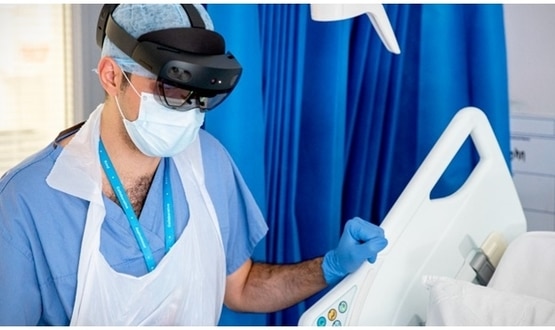Imperial College docs using Microsoft HoloLens for Covid-19 ward rounds
- 9 June 2020

Doctors at Imperial College Healthcare NHS Trust have been piloting the use of Microsoft HoloLens to carry out ward rounds for patients with coronavirus.
By wearing the computer headset, the mixed-reality ward round means only one doctor has to enter the coronavirus ward.
During the ward rounds, the device sends a secure live video-feed to a computer screen in an room away from the ward, allowing healthcare professionals who would normally be physically present for the ward round to see everything the doctor treating the patients can see.
The headset enables the wearer to interact with ‘holograms’ made visible through the headset using just gestures and voice, which means the team outside the ward can also share medical notes, scans and x-rays via the headset for the doctor to see while with the patient.
Dr Louis Koizia, consultant physician and geriatrician at Imperial College Healthcare, said: “It has been great to see the impact using the HoloLens has had on both our patients and staff.
“We have been able to limit the amount of healthcare professionals needing to be physically present at the patient’s bedside during ward rounds but still been able to provide the best possible care.”
HoloLens has been used by surgeons and interventional radiologists at the trust since 2017 and teams soon spotted how the headset could help with our response to the pandemic, to assist and reduce exposure when caring for patients who have tested positive for coronavirus.
Early research has shown that using HoloLens has led to a fall in the amount of time staff are spending on coronavirus wards up to 83%. It is also significantly reducing the amount of personal protective equipment (PPE) being used, as only the doctor wearing the headset has to dress in PPE.




